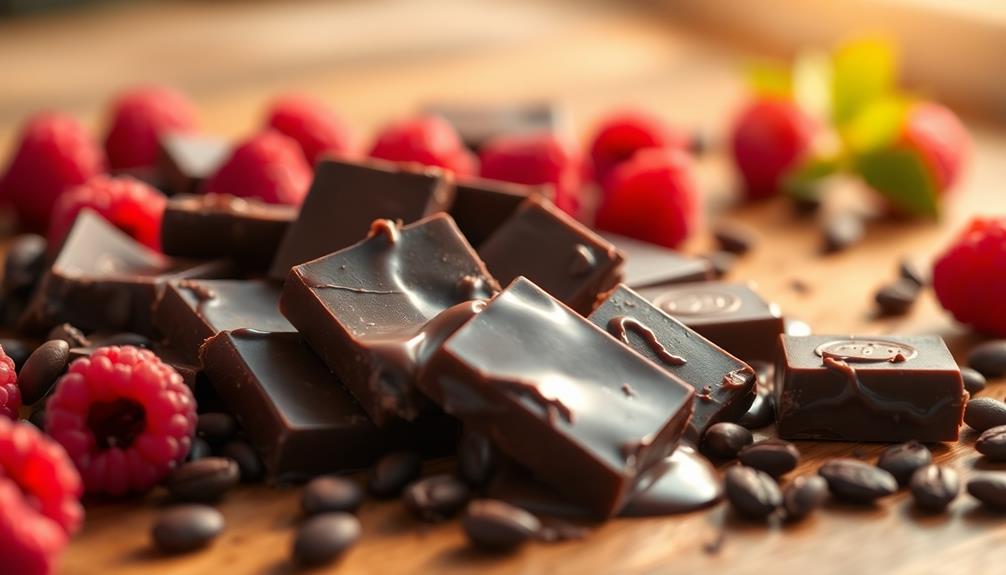Chocolate makes you feel good because it's packed with compounds that affect your brain and mood. Tryptophan boosts serotonin, the happiness hormone, while phenylethylamine (PEA) mimics feelings of love and excitement. Theobromine acts as a mild stimulant, enhancing your overall sense of well-being. Plus, sugar releases dopamine, heightening pleasure. On top of that, chocolate often reminds you of joyful occasions, making it a comforting treat. Just remember, moderation is key for health benefits. Curious about how these effects can play a role in your daily life? You might find the next insights even more interesting.
Key Takeaways
- Chocolate stimulates serotonin production, enhancing mood and promoting feelings of happiness.
- The presence of phenylethylamine (PEA) mimics love sensations, elevating enjoyment.
- Endorphins released during chocolate consumption contribute to overall feelings of satisfaction.
- Flavonols in cocoa improve blood flow to the brain, boosting cognitive function and alertness.
- Theobromine acts as a mild stimulant, providing uplifting sensations and relaxation.
Mood Enhancement Mechanisms

Chocolate's mood-enhancing properties are captivating and rooted in its unique chemical composition. When you indulge in chocolate, you're not just satisfying a craving; you're also stimulating your brain's chemistry to promote feelings of happiness. One of the key components is tryptophan, an amino acid that aids in serotonin production. This neurotransmitter is essential for elevating your mood and fostering positive feelings.
Curiously, just like how a Graveyard Taco Dip can elevate the festive spirit at gatherings, chocolate can create a sense of joy and celebration in your personal moments.
Moreover, chocolate contains phenylethylamine (PEA), which stimulates the pleasure centers in your brain. This chemical is associated with feelings of love and excitement, making each bite feel even more rewarding. Additionally, theobromine, an alkaloid present in chocolate, acts as a mild stimulant, further enhancing the uplifting sensation you experience.
As you savor chocolate, your body also triggers the release of endorphins—natural substances that promote happiness and satisfaction. The sugar in chocolate plays a role too, stimulating dopamine release and creating those pleasurable sensations that keep you coming back for more.
Cognitive Benefits of Chocolate

Indulging in chocolate doesn't just satisfy your sweet tooth; it can also sharpen your mind. The flavonols found in cocoa enhance blood flow to your brain, potentially improving cognitive function and clarity of thought.
Notably, just like the rich flavors of Red-Braised Pork Belly can evoke a sense of comfort, chocolate can create a similar response in our brains, promoting feelings of happiness and satisfaction. When you reach for a piece of dark chocolate, you're not just treating yourself; you're also giving your brain a chance to thrive.
The caffeine in chocolate increases alertness and focus, providing a much-needed mental boost during those sluggish moments. Regular consumption of dark chocolate, rich in antioxidants, has been linked to improved cognitive performance and may even reduce the risk of cognitive decline as you age.
Furthermore, chocolate contains tryptophan, which aids in the production of serotonin, a neurotransmitter essential for better mood regulation and cognitive processing.
Studies suggest that consuming chocolate can lead to a temporary increase in cognitive abilities, making it a valuable tool for tackling demanding tasks.
Natural Feel-Good Effects

Often overlooked, the natural feel-good effects of chocolate can greatly boost your mood. When you indulge in chocolate, your brain kicks into gear, stimulating the production of serotonin, a key player in promoting feelings of happiness and well-being. The tryptophan in chocolate helps synthesize this serotonin, enhancing its mood-lifting properties.
Just like the comforting flavors of Mushroom Masala can elevate your dining experience, chocolate can elevate your spirits.
As you savor chocolate, your body releases endorphins, those natural chemicals that elevate your mood and create a satisfying sensation. You might even feel a rush of excitement due to phenylethylamine (PEA), which stimulates pleasure centers in your brain, mimicking the sensations of love and thrill.
Additionally, theobromine, an alkaloid found in chocolate, offers a mild stimulant effect that brings about feelings of relaxation and stress relief.
Cultural and Psychological Influences

Embracing chocolate as a comfort food reveals its deep-rooted cultural and psychological significance. You probably reach for chocolate during times of emotional distress, finding it a reliable psychological remedy for sadness or stress. This connection isn't just personal; cultural associations link chocolate to celebrations and rewards, enhancing your feelings of happiness.
In many cultures, including Brazilian cuisine, sweets like Brigadeiro are often associated with festive occasions, further embedding these treats into our emotional lives. For example, in Brazil, Brigadeiro is a popular sweet often made for birthday parties and other celebrations. The rich, chocolatey taste and the act of rolling the mixture into small balls creates a sense of joy and nostalgia for those enjoying it. Similarly, in the United States, the mummy dogs recipe is a Halloween tradition that brings families and friends together to share in the fun of making and eating these spooky treats.
Consider these influences:
- Celebratory moments: Chocolate often marks special occasions, reinforcing positive experiences.
- Social bonding: Sharing chocolate during gatherings fosters connections with others, making it a communal delight.
- Nostalgia: The taste and smell of chocolate can evoke fond memories, adding to your overall well-being.
- Media portrayal: Advertisements often depict chocolate as a solution to emotional issues, shaping your perception of its benefits.
- Comfort food status: When you indulge in chocolate, it serves as a familiar comfort that provides solace.
Together, these factors create a rich tapestry of experiences that make chocolate more than just a treat; it's a source of joy that transcends individual moments and connects you to broader cultural narratives.
Health Considerations and Moderation

When it comes to enjoying chocolate, health considerations and moderation play essential roles in your overall well-being. While dark chocolate is known for its higher antioxidant content and potential heart health benefits, indulging excessively can lead to health issues like weight gain and increased sugar content.
You might enjoy the feelings of happiness that chocolate brings, but it's vital to balance your choices. Incorporating elements of a balanced diet, such as the nutrient-rich Nettle and Potato Soup, can further enhance your health while enjoying treats like chocolate.
Moderation is key. Opt for dark chocolate over milk chocolate to maximize health benefits while minimizing sugar intake. Even small amounts of dark chocolate can boost serotonin levels, enhancing your mood without the risk of overindulgence.
Be mindful of how much you eat; awareness of chocolate's addictive potential can help you maintain a healthy relationship with sweets.
As ongoing research sheds light on chocolate consumption, it reinforces the importance of moderation. You can savor the delightful taste and experience the positive effects without compromising your health.
Frequently Asked Questions
Why Does Eating Chocolate Make Me Feel Better?
Eating chocolate can lift your mood because it boosts serotonin levels in your brain, releases feel-good chemicals, and mimics the blissful sensations of love. You're indulging in a delicious treat that enhances your happiness.
Why Is Chocolate so Satisfying?
Chocolate's satisfying nature comes from its rich flavors and textures, engaging your taste buds. The combination of sweetness and creaminess creates a delightful experience, making each bite a pleasurable moment you can't resist.
Why Does Chocolate Cheer You Up?
When you unwrap that chocolate bar, you're diving into a world of endorphins and serotonin. It not only lifts your mood, but it also comforts you, reducing stress and bringing back sweet memories.
Why Does Chocolate Calm Me Down?
When you eat chocolate, it calms you down because it releases theobromine and serotonin, which ease stress. The sugar boosts dopamine levels, making you feel satisfied and relaxed, enhancing your overall mood and tranquility.
Conclusion
In the end, chocolate isn't just a treat; it's a hug for your soul. With each bite, you reveal a treasure chest of joy, lifting your spirits like a warm breeze on a chilly day. It dances on your taste buds, igniting memories and comfort. Just remember, moderation is key—like savoring a beautiful sunset, you want to cherish the moment, not let it fade away. So go ahead, indulge a little, and let the sweet magic wash over you.









